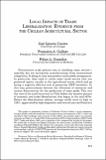| dc.contributor.author | Cuesta, José Ignacio | |
| dc.contributor.author | Gallego Yáñez, Francisco | |
| dc.contributor.author | González, Felipe A. | |
| dc.coverage.spatial | CHILE | es_ES |
| dc.date.accessioned | 2019-11-01T00:07:19Z | |
| dc.date.available | 2019-11-01T00:07:19Z | |
| dc.date.issued | 2015 | |
| dc.identifier.isbn | 978-956-7421-48-0 | |
| dc.identifier.uri | https://hdl.handle.net/20.500.12580/3832 | |
| dc.description | Protectionist trade policies aim at shielding some sectors— typically but not exclusively manufacturing—from international competition. In doing so they may produce unintended consequences. In particular they tend to create some taxed sectors that use protected inputs usually in the agricultural sector which end up facing a negative effective rate of protection (ERP hereafter). In this way protectionism distorts the allocation of resources and creates disincentives for the production of some goods. This was the case of the tariff structure in Chile before the massive process of economic and trade liberalization that began in the mid-1970s. | |
| dc.format | .pdf | |
| dc.format.extent | Sección o Parte de un Documento | |
| dc.format.medium | p. 351-378 | |
| dc.language.iso | eng | |
| dc.publisher | Banco Central de Chile | |
| dc.relation.ispartof | Series on Central Banking Analysis and Economic Policies no. 21 | |
| dc.rights | Attribution-NonCommercial-NoDerivs 3.0 Chile | * |
| dc.rights.uri | http://creativecommons.org/licenses/by-nc-nd/3.0/cl/ | * |
| dc.subject | PROTECCIONISMO | es_ES |
| dc.subject | SECTOR AGROPECUARIO | es_ES |
| dc.subject | LIBRE COMERCIO | es_ES |
| dc.title | Local impacts of trade liberalization: evidence from the chilean agricultural sector | |
| dc.type.doc | Artículo | |
| dc.file.name | BCCh-sbc-v21-p351_378 | |


